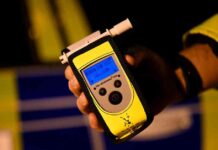Authorities in Guyana recently intercepted a semisubmersible vessel, or “narco sub,” used for trafficking drugs across South America and internationally. The homemade vessel was capable of transporting up to 3 tons of cocaine at a time and was part of a larger operation conducted by Interpol to crack down on drug trafficking and theft in more than two dozen countries.
During the operation, known as Operation Lionfish Hurricane, Interpol seized a total of 615 tons of illegal drugs and 505 tons of precursor chemicals worth $1.6 billion. Additionally, 65 stolen cars were confiscated in 31 different nations. The effort led to 206 arrests and the confiscation of over 56 tons of cocaine and 52 tons of other drugs, including marijuana, ketamine, and tramadol.
Interpol Secretary General Jürgen Stock highlighted the unprecedented scale of the operation, noting that the value of the seized drugs exceeded the GDP of some countries. He emphasized the need for international cooperation to combat transnational organized crime groups and the threat they pose to national security.
“Narco subs” are semisubmersible vessels commonly used by drug cartels based in Central or South America to transport illegal drugs across international borders. Earlier this year, the Colombian Navy intercepted two narco subs off the country’s Pacific coast, seizing nearly 5 tons of cocaine destined for Central America. Colombian authorities have been successful in intercepting these vessels, with 13 narco subs seized in 2024 following 20 interceptions in 2023.
The recent seizures demonstrate the ongoing challenge posed by drug trafficking and transnational crime networks in the region. The United Nations has observed an increase in tramadol smuggling, highlighting the evolving tactics used by criminal organizations to transport illicit substances.
Efforts to combat drug trafficking and organized crime require coordinated international action to disrupt supply chains and dismantle criminal networks. The success of operations like Operation Lionfish Hurricane underscores the importance of collaboration between law enforcement agencies across borders to address the global threat posed by drug trafficking.























